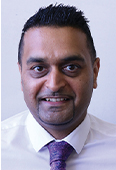On the move: Patel makes move into London director role
 It’s never easy coming into a substantive finance director role for the first time and Bimal Patel describes his first few weeks as chief finance officer at North Middlesex University Hospital NHS Trust as a baptism of fire. It has been dominated by the health service response to the coronavirus, Covid-19, but he is well prepared through 20 years of NHS finance experience and a strong support network.
It’s never easy coming into a substantive finance director role for the first time and Bimal Patel describes his first few weeks as chief finance officer at North Middlesex University Hospital NHS Trust as a baptism of fire. It has been dominated by the health service response to the coronavirus, Covid-19, but he is well prepared through 20 years of NHS finance experience and a strong support network.
In the six months immediately before his appointment at North Middlesex, Mr Patel was acting chief financial officer at London North West University Healthcare NHS Trust. He spent more than four years in senior finance positions at the trust, including as deputy director of finance and finance director, and has been enrolled in national programmes aimed at developing the next group of NHS executives.
‘The transition has been good for me, as the last six months at London North West has given me experience of being a CFO in an organisation that’s quite challenged, both operationally and financially. Despite that, it was an excellent way of seeing community and acute services working together within a complex STP.
‘I had a great desire to be a CFO in the NHS. It’s something I always wanted to do, and my career progression has been about getting to that point. More than anything else, I wanted to be a CFO at an acute trust as I enjoy working with clinicians and understand the needs of patients within an acute setting.’
He adds: ‘North Middlesex is the right size for my first CFO role and the executive team have been great in my first few weeks during a difficult time globally. I was so impressed that the trust had a forward view for its population and am looking forward to inputting into the trust’s clinical strategy.’
Mr Patel has benefited from having a coach and mentors across London, singling out the support he has received from CFOs he has worked with before, as well as new CFOs and those at NHS England and NHS Improvement.
‘You need people around you to shape you and see how you are doing. When preparing for the interview for this job, I made sure I spoke to the right people; talked through what I am about, what the trust wanted from me and what I wanted from the organisation.’
He was also on the aspiring finance leaders’ scheme, which was a national talent pool, and, before that, the Nye Bevan programme. While these were both beneficial, they are very different programmes, he says. The Nye Bevan scheme is geared to helping anyone who is hoping to move to an executive role, not just in finance, and to work on a board.
‘On the aspiring finance directors’ programme, you can build a strong network in your area of expertise. These two programmes reinforced my belief that I wanted to be a CFO. The job at North Middlesex came along, and I knew it was the right move for me.’
Covid-19 will take up a lot of operational and executive time in the coming months, but Mr Patel also maintains a focus on other issues. As with many London trusts, North Middlesex faces financial and operational challenges. He says the executive team is strong and determined to tackle these issues, and to turn a Care Quality Commission rating of ‘requires improvement’ to ‘good’.
Mr Patel’s portfolio is not limited to finance – he also heads work on IT, informatics and performance. ‘That additional learning for me is really good. I have a solid team behind me that I am looking forward to working with,’ he says.
The Middlesex trust is a global digital exemplar fast-follower and he is focused on delivering the programme, as well as helping ensure the trust’s response to Covid-19 meets patient and staff needs.
‘We want to balance finance and operational challenges and address the ever-increasing nonelective demand,’ he says.
This may require difficult decisions – on staffing, productivity or throughput, for example – but Mr Patel is looking forward to the challenge of transformation and working at a system level.
He highlights the fact that elective patients who have procedures postponed in the next few months will still need the work to be done when the coronavirus pressure recedes. ‘We will have to get the IT and information to the right place to help clinicians make sound decisions and work as efficiently as we can,’ he says.
Related content
We are excited to bring you a fun packed Eastern Branch Conference in 2025 over three days.
This event is for those that will benefit from an overview of costing in the NHS or those new to costing and will cover why we cost and the processes.